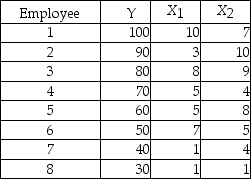TABLE 14-1
A manager of a product sales group believes the number of sales made by an employee (Y) depends on how many years that employee has been with the company (X1) and how he/she scored on a business aptitude test (X2) .A random sample of 8 employees provides the following: 
-Referring to Table 14-1,for these data,what is the estimated coefficient for the variable representing scores on the aptitude test,b2?
Definitions:
Structural Risks
Refers to the potential for failure or significant damage to a system, organization, or structure due to inherent weaknesses or flaws.
Operational Risks
The possibility of experiencing a loss due to inefficient or malfunctioning internal procedures, individuals, and systems, or owing to occurrences outside the organization's control.
Vendors Quality
The measure of excellence or state of being free from defects, deficiencies, and significant variations, brought by the strict and consistent adherence to measurable and verifiable standards to meet consumer's satisfaction by the vendor.
Poverty Trap
A situation in which an individual or community remains in poverty because their low income prevents them from investing in opportunities that could increase their wealth.
Q2: Photorespiration<br>A) generates carbon dioxide and consumes ATP
Q21: Which of the following is the best
Q40: Referring to Table 14-3, to test whether
Q40: A political pollster randomly selects a sample
Q62: If we have taken into account all
Q91: Referring to Table 16-11, the fitted values
Q106: The manager of a company believed that
Q130: Referring to Table 16-5, in testing the
Q191: Referring to Table 13-12, you can be
Q193: The slope (b<sub>1</sub>) represents<br>A) predicted value of